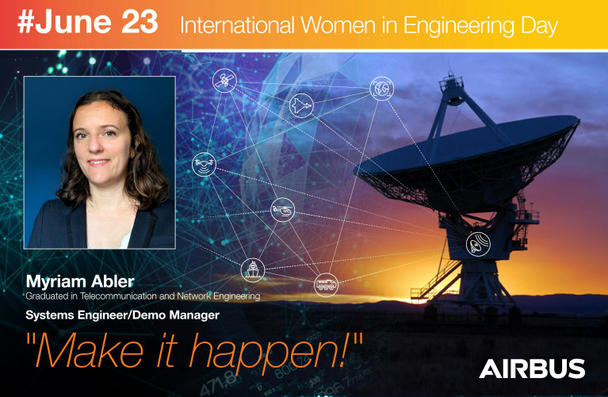Celebrating International Women in Engineering Day!

Last year, for International Day of Women in Engineering, we interviewed Caroline Trapero Antonin, discussing her experience as the Head of the Products and Solutions Center of Competence in Airbus.
For this edition, Myriam Abler, System Engineer and Demo Project Manager, shares her vision on being an female engineer at Airbus Secure Communications.
Can you please present yourself (name, current position)?
I am Myriam Abler, and I am currently working as a System Engineer and Demo Project Manager. I will soon become a Satcom Services Solution Manager, working especially with MSS (Mobile Satellite Services).
How would you describe yourself in three words?
I would describe myself as:
- Energetic, is an adjective that I often get,
- Curious, I like to understand how things work in general,
- Proactive to take things further, I would not hesitate to step in to help solve a problem if needed.
Can you tell us about your career history (education, professional)?
After getting my A levels, I undertook 2 years of preparatory classes. Following those 2 years, I got into INP-ENSEEIHT, an engineering school, in which I graduated as an Engineer in Telecommunications and Network.
I have always been interested in science, and people close to me as well as my teachers have always encouraged me to pursue engineering studies. Coming from an engineering background - my father and older sister being engineers - and with my ease in science, this journey had always been a logical consequence after graduating from high school.
After graduating from engineering school and finishing my end of studies internship in automobile embedded systems, I became a research engineer at IRIT (IT Research Institute) working on avionic networks. It was only by working at CNES as a Satcom and Network Engineer that my career in aerospace engineering had been confirmed.
Why did you decide to join Airbus?
During my studies, I learnt about Airbus' diverse portfolio in Satcom, as well as Airbus’ reputation internationally, and it attracted me. Moreover, compared to other companies’ job offers, I found Airbus’ missions were more diverse and met what I was looking for.
Which project have you worked on?
Since I joined Airbus, I contributed to COMMFLEX Multi-Domain leveraging One Web Services and the Meta-Operator project. I helped to understand how the functionalities of commercial services provided by SNO work (Satellite Network Operators, such as OneWeb, Intelsat, Inmarsat, SES and so on), how we can implement these with our services and systems, which value can be added to the services, and all of this while proposing a simple interface that meets the customers’ needs.
I also implemented Satcom services demonstration to our clients, by showing them how Satcom services can be used and deployed for their use cases.
How would you define gender equality in your field?
In engineering school, the gender ratio really depends on specialties. In telecommunications and network, there were only 30% of females while in fluid mechanics, there were almost more females than males. In general, males still prevail over females in electrical and IT specialization.
At work, usually, gender equality is not reached. However, my department might be an exception, as my management is mostly formed by female directors, so I do not directly feel this inequality. Although, I can see it is not the case everywhere. So, my hierarchy proves that having female leaders is possible in this society but unfortunately males are still dominating decisive positions.
Unlike current actions in schools to promote engineering, I had none during my education before engineering school. However, by having a majority of female scientific teachers, I didn't feel the necessity to have those actions to guide me to engineering. It felt obvious that women could do such things.
Also, engineering is a very diverse sector as different kinds of engineers exist.
In your opinion, which changes are needed in the system to be more attractive to women in engineering?
I think we need:
- More female representatives in scientific fields, and more introduction to engineering in schools.
- A mentor from younger ages to see the potential of anyone, girls but not only, and to support and help in reaching the goals.
One advice to girls who want to pursue engineering studies?
Go for it! Do not hesitate to pursue those studies. Engineering studies are funnier than people might think as subjects are varied, there is one for everyone's taste. With determination and motivation, anything is possible.
“Make it happen!’ We need to be invested to move forward as only WE can take control of changes.
Find more interviews of our women in STEM here.